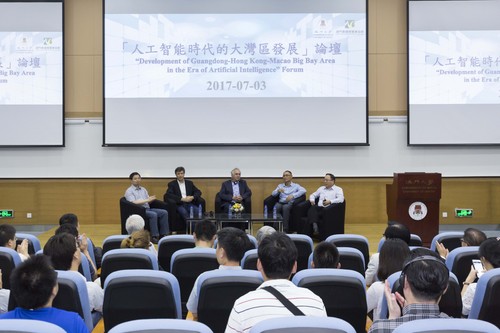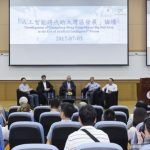 UM holds a forum on the development of the Big bay Area in the era of artificial intelligence
UM holds a forum on the development of the Big bay Area in the era of artificial intelligence
The University of Macau (UM) and the Macao Convention and Exhibition Association today (3 July) jointly held a public forum titled ‘Development of Guangdong-Hong Kong-Macao Big Bay Area in the Era of Artificial Intelligence’.
During the talk, Zhou Zhihua, professor from Nanjing University and Changjiang Scholar appointed by the Ministry of Education; and Yang Qiang, chair professor as well as New Bright Professor of Engineering from the Hong Kong University of Science and Technology, were the keynote speakers. Zhou Zhihua gave a speech on ‘machine learning’, while Yang Qiang gave a speech titled ‘From Deep Learning to Transfer Learning’.
In his welcome speech, UM Rector Wei Zhao said ‘artificial intelligence’ and ‘Big Bay Area’ are among the hottest subjects and are closely linked to teaching and research in information science.
Zhou and Yang discussed advanced technologies in the area of artificial intelligence and how they can help to develop the Guangdong-Hong Kong-Macao Big Bay Area. The event attracted experts and scholars, faculty members, students, and members of the general public.
Following their speeches, Zhou and Yang hosted a panel discussion with Prof Thomas Eiter from the Vienna University of Technology and Prof Bernhard Nebel from Freiburg University. They believe that the Big Bay Area has a well-developed manufacturing base and therefore enjoys an advantage in the manufacturing industry, and if the Big Bay Area can take full advantage of its technologies in artificial intelligence, it can expect to greatly increase its competitiveness.


